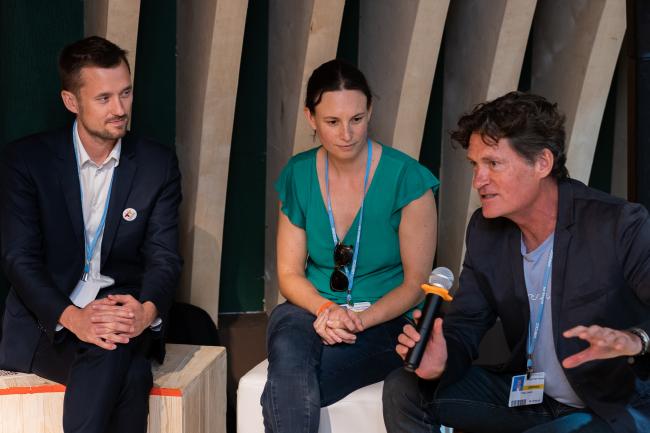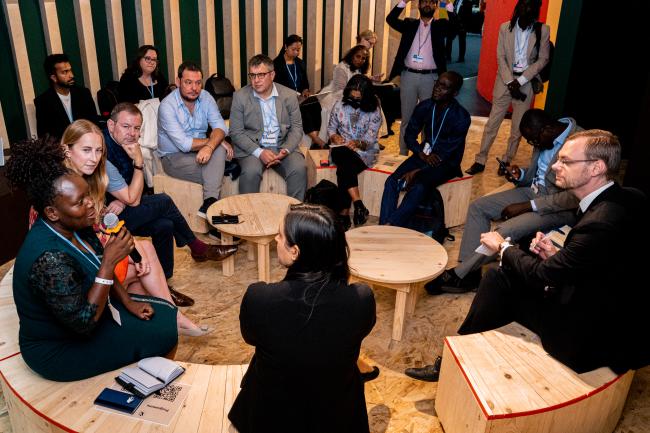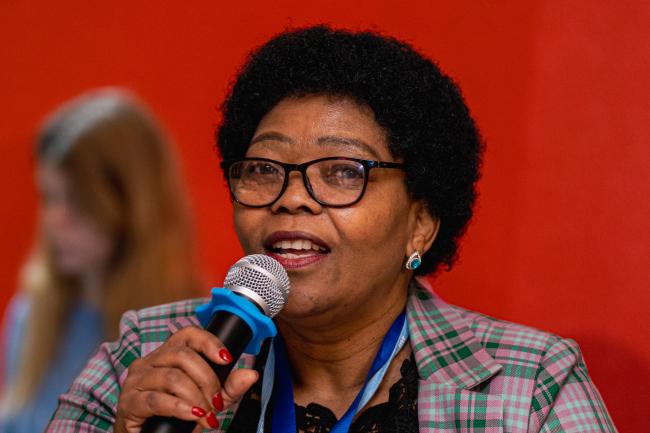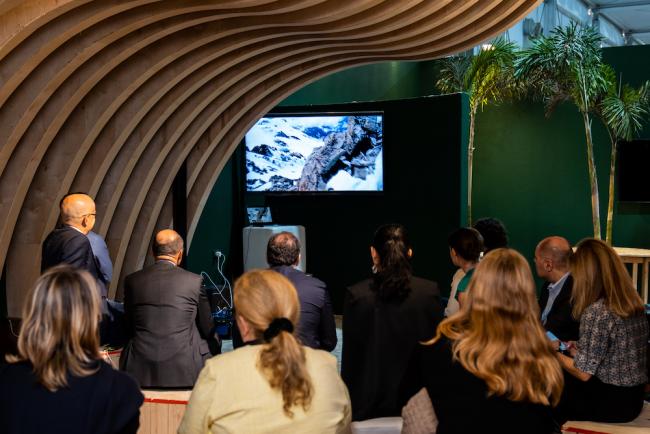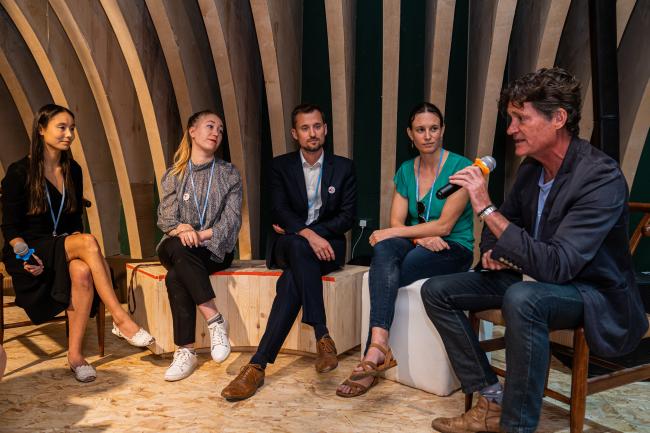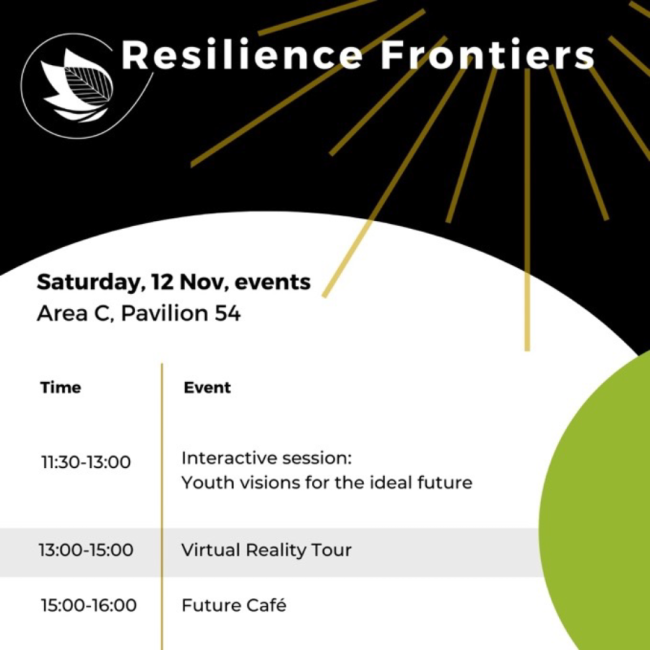Managing Water and Other Natural Resources Equitably and Inclusively
Managing our natural resources in participatory and equitable ways will allow us to create regenerative ecosystem services and build a desirable future. The fourth day of the Pavilion’s programme explored Pathway 4, which focused on experiences to manage water and other natural resources equitably and inclusively.
During the first event, titled Climate Intelligence for All, moderator Dennis Mombauer, SLYCAN Trust, invited speakers to share their experiences with the use of data technology to promote better resource management.
Steven Ramage, Group on Earth Observations (GEO), shared his experience working on GEO Global Water Sustainability (GEOGloWS), a platform that consolidates information on freshwater activities. Its data has been used to search areas with floods and drought, relating it to policies and initiatives aligned to Sustainable Development Goal 14 (life below water) and other frameworks such as the Sendai Framework for Disaster Risk Reduction. Further, he added, such data technologies are also useful to inform National Adaptation Plan processes and Nationally Determined Contributions (NDCs), citing how Belize’s coastal zone mapping informed their NDC revision.
Lucy Mtilatia, Ministry of Natural Resources and Climate Change, Malawi, shared Malawi’s work on the Integrated Community-Based Flood Early Warning System, which enables the Ministry to observe weather patterns and determine the “gauges of river flows,” She pointed out that as a result of the measures undertaken, they are able to: help people located in disaster-prone areas to prepare; carry out anticipatory measures; and provide information to the communities to enable them to make proper decisions.
Jennifer Phillips, InsuResilience Global Partnership, presented the company’s different insurance schemes that enable people to rebuild their assets after a natural disaster. In determining risk, she highlighted how they use remotely sensed satellite data to determine the areas with a higher risk of floods and the likelihood of a natural disasters occurring. Having more data is essential to identify which areas are more susceptible to natural disasters such as flooding, she stressed.
In the Pavilion’s second event on technology’s interface with nature, moderator Paris Marx, author, invited speakers to share their thoughts on what socioeconomic implications must be considered in technology research and development, especially as it relates to social impact and natural resources management, and the challenges in implementing initiatives that address these.
Nouran El Said, Founder, Plug’n’Grow, pointed out that the main challenge for growers is equipping them with the necessary tools and resources to improve the position of the growers in the value chain. She noted that building the capacity of growers has multiple benefits, including establishing fertilizer savings and reducing their carbon footprint.
Gayle Schueller, 3M, emphasized the importance of bringing sustainability into the development of their products, stating that “every product we create must have a sustainability value.” For example, she mentioned a new roof coating that reduces heat and pulls smog out of the air.
Adriana Casillas, Chief Executive Officer, Tebrio, discussed how the company is developing more sustainable food systems for animals. She emphasized that the company believes in creating “impact on the value chain from the base to make food more sustainable.”
Kate Wharton, CrossBoundary, discussed that, as an investment firm, the fundamental challenge for them is “addressing the value and the price of ecosystems today.” She emphasized that while there is value in carbon markets, there may also be ways to monetize ecosystems, as “there is inherent value in them.” She added that “what matters though is how that value is captured and distributed and this is where technology has a role to play.”
Gijs Bosman, Weather Makers, emphasized the need to “steer industries” to restore nature because there is value in nature. He cautioned, however, that, instead of helping, technology might accelerate the way we destroy our planet.
Marx then opened the floor to comments and questions from the participants. Philda Nani Kereng, Minister, Ministry of Environment, Natural Resources Conservation, and Tourism, Botswana, discussed the policies her country has established to address climate change issues and benefit-sharing of natural resources. She also highlighted the need to learn from youth and involve them in discussions around climate change and in making decisions, praising their creative and innovative ideas to finding solutions. “The issue of being creative is important because we cannot sustain ourselves if we rely on old practices,” she concluded.
In the afternoon, the Pavilion hosted a viewing of The Last Glaciers, a film supported by BNP Paribas Foundation that explores the relationship between climate change, mountain environments, and the loss of glaciers. This was followed by a discussion about the film with the director Craig Leeson.
Pavilion guests also participated in interactive games, including a virtual reality experience designed to encourage transformative change.
Organizers: Resilience Frontiers, UNFCCC
Contact: Susan Robertson I srobertson@unfccc.int
For more information: https://resiliencefrontiers.org/cop-27
To receive free coverage of global environmental events delivered to your inbox, subscribe to the ENB Update newsletter.

